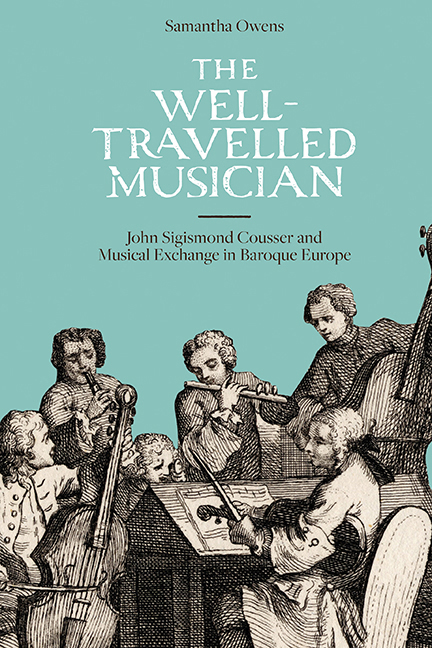Book contents
- Frontmatter
- Dedcation
- Contents
- List of Tables
- Preface
- Abbreviations
- Notes on Sources
- Introduction: John Sigismond Cousser and his ‘Commonplace Book’
- 1 Hungarian Beginnings and the Adoption of French Musical Style
- 2 Kapellmeister at the Wolfenbüttel Court and Braunschweig Opera House
- 3 Ariadne to Porus: Cousser's Braunschweig Operas
- 4 ‘The Incomparable Director’ in Hamburg, Nuremberg and Augsburg
- 5 Heliconische Musen-Lust: Opera at the Württemberg Court
- 6 ‘Il Paradiso terrestre’? Cousser in London
- 7 ‘Fortune not Blind’: Music for Dublin Castle
- 8 ‘Our Concert’: A Musician at Home
- 9 Cousser's ‘collection of fine musick’ and the Practicalities of Musical Exchange
- Appendix 1 Summary of the Contents of Cousser's ‘Commonplace Book’
- Appendix 2 Cousser's Address Book
- Appendix 3 Cousser's Books of Cantatas, Madrigals, Duets and Serenatas
- Appendix 4 Cousser's Inventory of Ouverture Incipits
- Appendix 5 Transcription of Cousser's Notes for his 1716 Trip to London and the Continent
- Bibliography
- Index
- Titles listed here were originally published under the series title Music in Britain, 1600–1900
- New titles published under the series title Music in Britain, 1600–2000
6 - ‘Il Paradiso terrestre’? Cousser in London
Published online by Cambridge University Press: 30 August 2019
- Frontmatter
- Dedcation
- Contents
- List of Tables
- Preface
- Abbreviations
- Notes on Sources
- Introduction: John Sigismond Cousser and his ‘Commonplace Book’
- 1 Hungarian Beginnings and the Adoption of French Musical Style
- 2 Kapellmeister at the Wolfenbüttel Court and Braunschweig Opera House
- 3 Ariadne to Porus: Cousser's Braunschweig Operas
- 4 ‘The Incomparable Director’ in Hamburg, Nuremberg and Augsburg
- 5 Heliconische Musen-Lust: Opera at the Württemberg Court
- 6 ‘Il Paradiso terrestre’? Cousser in London
- 7 ‘Fortune not Blind’: Music for Dublin Castle
- 8 ‘Our Concert’: A Musician at Home
- 9 Cousser's ‘collection of fine musick’ and the Practicalities of Musical Exchange
- Appendix 1 Summary of the Contents of Cousser's ‘Commonplace Book’
- Appendix 2 Cousser's Address Book
- Appendix 3 Cousser's Books of Cantatas, Madrigals, Duets and Serenatas
- Appendix 4 Cousser's Inventory of Ouverture Incipits
- Appendix 5 Transcription of Cousser's Notes for his 1716 Trip to London and the Continent
- Bibliography
- Index
- Titles listed here were originally published under the series title Music in Britain, 1600–1900
- New titles published under the series title Music in Britain, 1600–2000
Summary
❧ ‘Praise the deceased Purcell to the skies’: Cousser's Move to London
As in so many other periods in Cousser's life, his location during the months between his departure from Stuttgart, in mid-May 1704, and his arrival in London later that same year, on 25 December, is no longer known. Perhaps he visited his wife and daughters in Braunschweig or made a return trip to the Palatine court. Whatever the case, it certainly seems plausible that Cousser's move to England was prompted partly by information gleaned from Palatine court musicians, given the close links between the Düsseldorf courtier and composer Luigi Mancia (c. 1665–after 1708) and the Roman violinist Nicola Cosimi (c. 1660–1717), who had arrived in London in March 1701. In a letter written to Cosimi on 15 January 1702 – and hand-delivered by another Palatine court musician, Carlo Luigi Pietragrua (c. 1665–1726) – Mancia asked for news of the success of Italian music in England, noting the country's reputation as an ‘earthly paradise’. A personal acquaintance between Mancia and Cousser seems to be suggested not only by the entry for him in Cousser's address book, but also from a ‘superb’ fever remedy supplied by ‘S[igno]r. Mancia’ that Cousser copied into his notebook. In addition, Cousser owned a selection of Mancia's music, including sonatas, a concerto, the favola pastorale La costanza nelle selve (Hanover, 1697), a motet, Ad arma volate o furie superbe, and the cantata Qui dove il fato rio.
Cousser appears to have been even more closely acquainted with the Palatine court Kapellmeister Johann Hugo Wilderer, who had presumably been responsible for inviting him to Heidelberg to take part in the performance of his serenata La presa di Landau in around September 1702. Frequent listings for music by both Wilderer and his concertmaster Georg Andreas Kraft occur throughout Cousser's notebook. That Cousser held Wilderer's compositional abilities in high regard can be inferred from the fact that at least two performances of Wilderer's works took place in Dublin under his auspices in the early decades of the eighteenth century. The first work was a ‘Pastoral à 3 …
- Type
- Chapter
- Information
- The Well-Travelled MusicianJohn Sigismond Cousser and Musical Exchange in Baroque Europe, pp. 97 - 119Publisher: Boydell & BrewerPrint publication year: 2017

